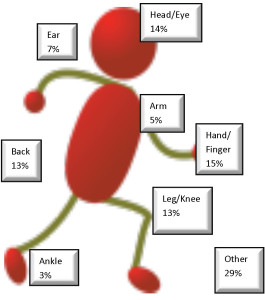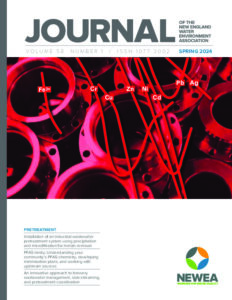 Early in 2015, the NEWEA Safety Committee emailed its annual Wastewater Facility Safety Survey for the 2014 work year to facilities throughout the six New England states. The purpose of the annual survey is to:
Early in 2015, the NEWEA Safety Committee emailed its annual Wastewater Facility Safety Survey for the 2014 work year to facilities throughout the six New England states. The purpose of the annual survey is to:
- Collect regional incident and injury statistics and publish them for use by all wastewater professionals to benchmark their safety programs,
- Identify those areas and activities where injuries are occurring so that facility managers can better focus their safety efforts, and
- Gather information regarding the status of safety programs at wastewater treatment facilities throughout New England.
For the 2013 work year, 28% of those facilities returning surveys reported at least one incident. For 2014, that rate increased to 34%. There were a total of 59 injuries reported, with 27 of those causing lost workdays – meaning almost half of all incidents reported were severe enough that the employee incurred lost workdays. Those 27 injuries resulted in 344 total lost workdays.
The body part most frequently injured in 2014 was the hand. The majority of those injuries were cuts caused by “struck against” injuries (e.g. cleaning pump or machine, repairing hose, opening hatchway, etc.). Head injuries were the second most common and the majority of those were pain caused by “struck against” injuries (e.g. slipping on ice, fell cleaning a utility room, fell off staging, etc.).
Machine guarding and safety gloves are common ways to approach hand safety hazards such as using tools, operating equipment, handling rough materials and chemicals, and stacking and storing objects. In addition to these safeguards, make sure you also take a moment to think about the task you need to perform and the potential hazards involved. What if…the knife slips while I am stripping this wire? Will I cut myself? What if…the screwdriver slips off this stubborn screw I’m trying to remove from this box in my hand? Will I punch the screwdriver through the palm of my hand? What if…there’s a little bit of chemical left in the line I’m working on? Will my hands be burned? By analyzing the potential hazards you could face, you will be better prepared to choose the appropriate means to protect yourself.
In addition to providing incident information, many of the survey respondents also expressed common concerns regarding their biggest safety challenges. The list below represents the top concerns:
- Avoiding complacency during daily job tasks
- Keeping up-to-date with required training (money, resources and time)
- Employees slipping, tripping or falling
- Confined spaces (identification and procedures)
- Funding
This information helps us to understand where the majority of our losses and challenges are coming from, and may allow us to plan resources for these areas in the future. The Safety Committee is pleased to have provided this information and we hope that members find it useful. As expected, the survey highlighted the fact that accidents are a reality in our facilities, and that additional efforts are needed to improve our safety programs and protect our personnel. The vast majority of these incidents are preventable. We would like to once again thank all of the facilities that returned 2014 work year surveys and we strongly encourage all facilities to return the 2015 work year survey (watch for it in the spring of 2016) in order to help us increase the value of its results.
If you’re interested in joining the safety committee, please take a look at our Safety Committee page.
Respectfully Submitted,
NEWEA Safety Committee



No comments yet.